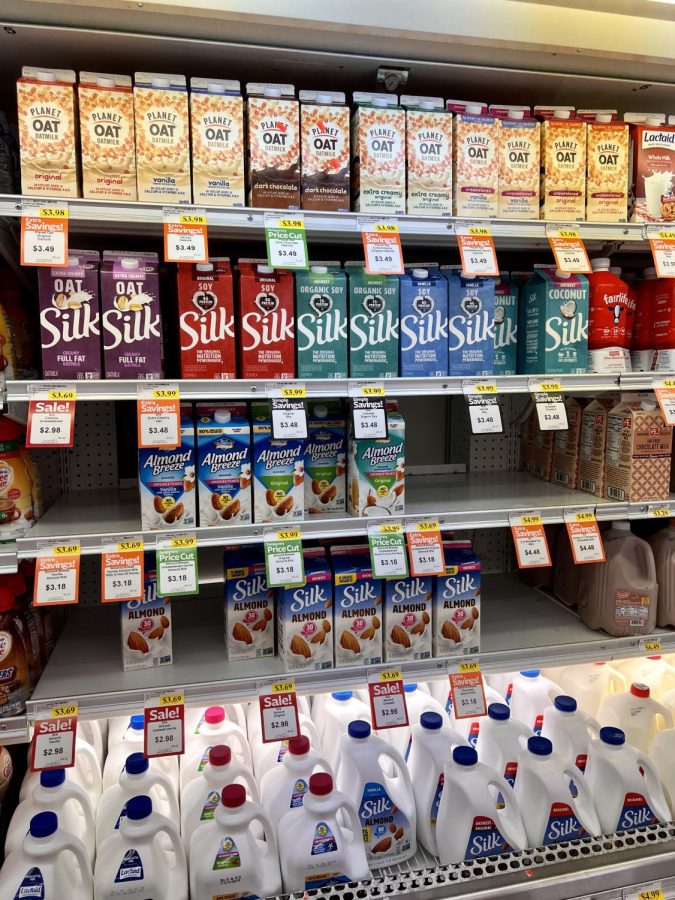Whether it is environmentalists looking for ways to lessen their impact on nature or teens wanting a different flavor in their iced latte, it is no surprise sales have increased for plant-based milk over the past couple years.
However, the question persists as to whether plant-based milks are really a better alternative. Everyone has different nutritional wants and needs and what milk is best for one person might not be the best option for another.
Local grocery stores have picked up on the need for variety in nutrition and now offer over a dozen different types of milk. These new choices have made cow milk slightly less popular. As consumers notice the popularity of new milk choices in the store, many begin to question which milk they should really be buying.
The popularity of dairy milk and other dairy products originally stemmed from the universal understanding that dairy milk is an essential part of a healthy diet. Many children grow up seeing the visual of a plate with proportions showing what a healthy meal looks like, and on every plate, dairy or milk is included. Do plant-based milks live up to the nutritional standards of dairy milk?
The answer is not as easy as a simple yes or no. Some plant-based milks have similar nutritional benefits as dairy milks do, but others do not compare.
Almond milk – one of the most popular dairy milk alternatives – is one plant based milk that arguably has minimal nutritional value compared to dairy milk. Compared to dairy milk of all varieties, almond milk has significantly less protein. The main reason why the majority of Americans incorporate dairy milk into their diet is it being a great source of protein. This makes it hard to even compare dairy and almond milk, as they cannot really be substituted for the same purposes.
In addition to the lack of protein in almond milk, the environmental impact of its production is disappointing. A study comparing almond milk and dairy milk concluded almond milk requires significantly more water to produce, while dairy milk has greater CO2 emissions. Additionally, after producing almond milk, manufacturers are left with almond pulp, which is hard to reuse in other products.
It is important to recognize all qualities of almond milks without grasping onto the misconception that all plant based milks are better than dairy milks nutritionally and environmentally.
Owner of Coffee Apothecary Lindsey Schmidt, replaced almond milk with sesame milk due to almond milk’s harm on the environment. “After digging through Hope & Sesames website, reading about their mission and how nut milk truly impacts our environment, I knew I needed to replace almond milk with sesame milk and add this company to the list of what makes our shop so unique, eco conscious and filled with ingenuity,” Schmidt said. “I was worried about the impact that removing almond milk would have on business, but I knew the more important choice was to stay the course and continue to make decisions that I believe will better impact our world and make sure coffee stays around for future generations.”
While almond and dairy milks do not closely resemble nutritionally, sesame and dairy milks are closer in relation. Sesame milk and 2% milk contain almost equal amounts of protein and fat, while levels of calcium and vitamin D are comparable as well. Unsweetened sesame milk even has little to no sugar or carbohydrates.
While most plant-based milks have a lesser environmental effect, for many people, they offer an equal or lesser nutritional value than dairy milk. Plant-based milks cannot yet completely replace dairy milks due to vital nutrients needed for growth. Therefore, people should evaluate their own nutritional needs and determine which option is the best fit.









Kerri R • May 13, 2022 at 10:31 pm
Personally I never considered much about milk it’s not particularly my drink of choice I much prefer water and preferably iced with a lemon slice if I’m being honest and fancy. But if I were to personally choose a milk like let’s say for my cereal on Saturday morning right before heading to work I would definitely choose dairy cow milk because it just gives you that iconic milk taste while the other options just leave you with a odd taste very nutty.